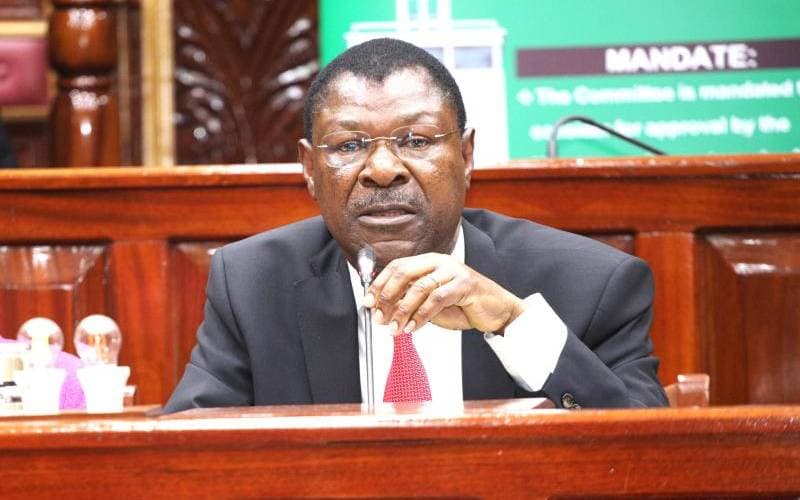We're loading the full news article for you. This includes the article content, images, author information, and related articles.
Kenya's 13th Parliament is under intense scrutiny for failing its constitutional oversight role, increasingly seen as subservient to the executive. This erosion of public trust is setting the stage for the 2027 general election to become a critical referendum on legislative accountability.

NAIROBI – Kenya’s Parliament, envisioned by the 2010 Constitution as the people's ultimate watchdog and a formidable check on executive power, is facing a profound crisis of confidence. A growing chorus of criticism from civil society, political analysts, and the public contends that the 13th Parliament has largely abdicated its oversight responsibilities, functioning more as a rubber stamp for the executive's agenda than an independent arm of government. This perceived weakness has fueled public anger and set the stage for the 2027 general election, which many now see as a potential day of judgment for the legislature.
The framers of the 2010 Constitution deliberately scattered state power to prevent the re-emergence of an imperial presidency, placing the bicameral Parliament at the heart of the country's governance framework. Under Articles 94 and 95, Parliament is granted the authority to legislate, represent the electorate, and, crucially, to exercise oversight over state organs. However, its performance since the 2022 elections has been widely criticized for failing to live up to this constitutional mandate.
A key flashpoint for public discontent has been the passage of contentious legislation despite significant opposition. The approval of the Finance Bill 2024, which triggered unprecedented nationwide protests in June 2024, is a primary example. Critics argue that Members of Parliament ignored widespread public outcry, highlighting a disconnect between the legislature and the citizenry. This followed a similar pattern with the Finance Bill 2023, where Mzalendo Trust, a parliamentary monitoring organization, noted that MPs did not heed Kenyans' calls to reject punitive tax clauses.
More recently, in October 2025, President William Ruto signed a raft of controversial bills into law that critics claim further weaken parliamentary oversight. Among them, the Privatisation Bill, 2025, grants the National Treasury the authority to sell state-owned enterprises without parliamentary approval, a move analysts fear could reduce public accountability. Simultaneously, amendments to the Computer Misuse and Cybercrimes Act granted government agencies broader powers to restrict online accounts, raising concerns about the potential to stifle dissent.
Parliamentary watchdog reports paint a grim picture of the legislature's effectiveness. The 2024 Parliamentary Scorecard released by Mzalendo Trust on December 8, 2024, noted that Parliament's priorities were often at odds with citizens' expectations. The report highlighted members' absenteeism, the disregard of citizen input in key bills, and voting patterns that did not reflect the public will as major concerns. Key issues for ordinary Kenyans, such as the high cost of living and unemployment, were not adequately addressed.
This perceived inaction extends to the management of public funds. Year after year, reports from the Office of the Auditor-General detail the loss of billions of shillings to wastage, ghost projects, and unaccounted-for spending, yet meaningful parliamentary action remains elusive. For the 2023/2024 financial year, the Auditor-General revealed that 24 ministries and departments failed to complete projects valued at KSh 37.92 billion due to poor oversight. This failure to hold the executive accountable for public expenditure has contributed to a ballooning national debt and a decline in the quality of public services.
The legislature has also entered into direct conflict with the Judiciary by attempting to entrench funds like the National Government Constituencies Development Fund (NG-CDF) in the constitution. Courts have repeatedly ruled such funds unconstitutional for violating the principle of separation of powers by assigning executive roles to legislators. Parliament's persistence in this matter is viewed by legal experts as an attempt to override judicial decisions and weaken institutional checks and balances.
The culmination of these issues has been a drastic decline in public trust. The violent protests of June 2024, which saw demonstrators breach the Parliament buildings, were described by analysts as an unprecedented vote of no confidence in elected representatives. According to a May 2024 poll by InfoTrack Research and Consulting, 63% of Kenyans felt the country was heading in the wrong direction, with the cost of living being the primary concern.
As the 2027 election cycle approaches, the performance of the 13th Parliament is set to become a central campaign issue. Commentators, echoing the sentiment of a November 21, 2025 Daily Nation column, argue that the election must be a 'judgment day' for a legislature that has 'chosen cowardice'. The focus is shifting towards urging voters to look beyond ethnic allegiances and patronage, and instead elect representatives committed to upholding the constitutional principles of oversight and accountability. The upcoming election will not only determine the composition of the next Parliament but will also serve as a critical test of Kenya's democratic resilience and the electorate's power to hold its institutions to account.
Keep the conversation in one place—threads here stay linked to the story and in the forums.
Sign in to start a discussion
Start a conversation about this story and keep it linked here.
Other hot threads
E-sports and Gaming Community in Kenya
Active 9 months ago
The Role of Technology in Modern Agriculture (AgriTech)
Active 9 months ago
Popular Recreational Activities Across Counties
Active 9 months ago
Investing in Youth Sports Development Programs
Active 9 months ago